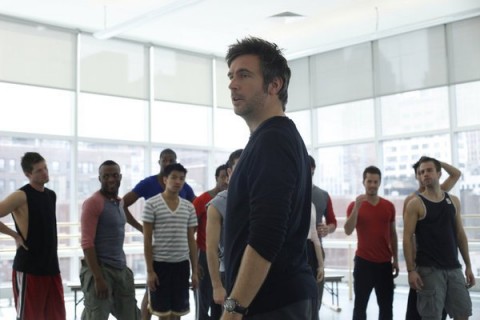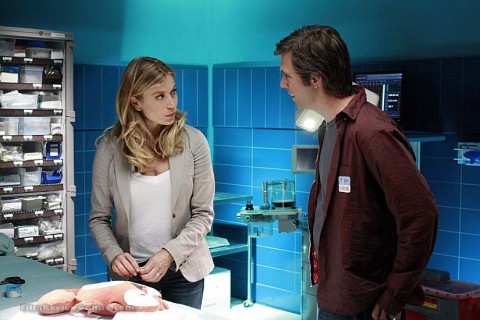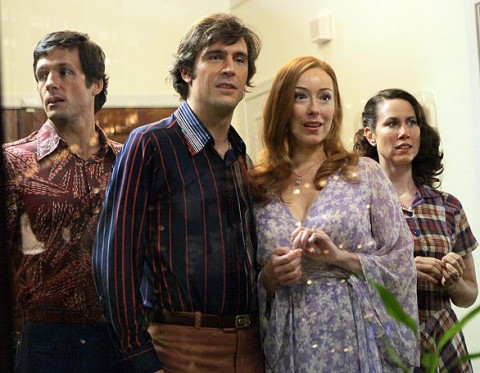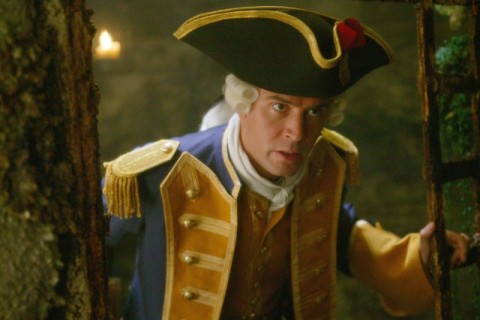Jack Davenport may not formally qualify for the descriptor “television staple” in the U.S, given that the majority of his Stateside series have lasted a single season or less, but between “Swingtown” in 2008 and “FlashForward” during the 2009-2010 season, he’s made enough headway on the airwaves that, when coupled with a U.K. success like “Coupling” and a recurring role in Disney’s “Pirates of the Caribbean” films, he’s at least in possession of a face that inspires people to wonder, “Wait, why do I know that guy?” Davenport creeps ever closer to a more immediate recognition level as he continues onward with the season season of NBC’s “Smash.” I was fortunate enough to chat with him for a bit during the January edition of the Television Critics Association press tour, and although we didn’t get into too much detail about his current work on “Smash” (mostly because the interview took place before I’d seen any of Season 2), we still ended up discussing a fair amount of his small-screen work, along with a few stops on his cinematic efforts.

Bullz-Eye: Your character on “Smash” is regularly described in reviews as “difficult but brilliant,” and even on the NBC website they sum him up in a single sentence by calling him “one of Broadway’s most brilliant, yet arrogant, director-choreographers.” Did you have to pay people off to get the word “brilliant” out there so prominently?
Jack Davenport: Probably, yeah. [Laughs.] You know, the way the character’s written is the way people generally refer to him, and you are to believe that the man has half a dozen Tonys, probably two musicals that are international franchises, but that also makes you cocky. Also, in the real world of show business, no one refers to anybody as talented or brilliant. But when you’re doing a show about show business, weirdly, you do have to point that out on occasion. Not too often, but it’s sort of… Otherwise, you’re not really setting the scene properly, I don’t think.
BE: True enough. A few adjectives can save the writers from having to come up with a complete back story right off the bat.
JD: Oh, yeah. And as for “difficult,” I think that one speaks for itself. [Laughs.]
BE: How much of Derek was on the page when you arrived, and how much has been added to the character since then?
JD: Well, you know, when you initially get a part on a series, you only have the pilot script to go on, but then things evolve as you grow into the part and the writers see what you’re doing with their stuff. If you’re fortunate enough to do something that lasts more than one year, in this context… What’s interesting is that I’ve done series—not in this country, I have to say—which did two, three, four seasons, but I’d sort of forgotten to a degree that, on some level, one develops a sense of…ownership, really. So you start to get a sense of what does and doesn’t quite feel right for that character.

What’s been really great about having Josh (Safran) is that, when I first met him, he sat down and sort of billed himself as extremely collaborative, and he’s been amazingly—and unnecessarily, I have to say—respectful of the fact that we sort of did it a year before he came here. So we have a very open dialogue about… not so much storyline, because, you know, he’s the show runner. But in terms of detail within scenes, he’s amazingly amenable, and I guess at this point you feel that’s it’s more a two-way street. When you do a first season of something, you don’t know any better than the writers do. Whatever comes down the pike, you just go [In a very silly voice.] “Okay!” Because, you know, the character hasn’t been established.
But the writers always—or at least they do in any cleverly-staffed writers room, which they generally are—see the rushes and stuff, and when they do, they see what works and what doesn’t, and they’re, like, “Oh, okay!” So I imagine it’s been shaped to me, and…it feels like a good fit!
BE: Can you talk a bit about Season 2 and Derek’s place in it?
JD: Well, the season starts with him in a similar place, inasmuch as it’s only three weeks later, but what you also find, and I think this is a great way to tame the character, is that some of his more questionable interpersonal tactics slightly come home to haunt him. It gives him a chance to be vulnerable, and he’s not a character who’s allowed to be vulnerable very often, because his job is to not be. His job is to start in front of rooms full of people where no one knows what the fuck to do next and say, “I have a plan!” So it’s been nice to have that facet to explore.
BE: To ask about your last series in this country, one of the ones you semi-referenced that didn’t make it beyond its first season, what were your feelings on the way “Flash Forward” wrapped up?

JD: Well, I mean, in truth… Look, clearly it wasn’t intended to only last for a season, and if you are doing a show in which the hook is an event that affects the entire planet, it’s unlikely to end after one season in a satisfactory fashion. [Laughs.] So, no, of course I wasn’t happy with how it wrapped up. There were loads of unanswered questions. But, sadly, that’s the way it went. When I sat down and met David Goyer when I took the job, though, David had a very clear, specific, and, frankly, a five-year vision of where that story was going to go. And he really just didn’t a chance to do it. So, of course, it was, like, “Oh, okay, so it’s blackouts interruptus, then, is it?” But what are you gonna do?
BE: When I interviewed Richard Curtis on the press junket for “Pirate Radio” a few years ago, I said, “Poor Jack Davenport’s character, Twatt…the name’s a bit on the nose, isn’t it?”
JD: [Laughs.] Well, Richard has a history with this. He has a tendency on occasion toward characters with names which are arguably a bit too on the nose as far as reflecting the person they are. I mean, I’m just saying… Would anyone with that surname not change it? But, again, what are you gonna do? It did seem a little on-the-nose to me as well, though.
BE: Given the resurgence in the popularity of vampires in recent years, how often do you find yourself being asked about “Ultra Violet” nowadays?
JD: Well, it’s funny. As you say, because vampirism in all its forms is all the rage… Funnily enough, David Goyer defined that show with the best soundbite I’ve ever heard about it, which was that it was like “Buffy the Vampire Slayer,” but with the high political seriousness of “The West Wing.” And it kind of was! Telly-literate people know that show well, because it was a damned clever idea. You know, vampires are just about the oldest story there is, and all of it’s been done to death…or un-death, as it were. [Laughs.] But I thought Joe (Ahearne), who wrote that show and directed all of it, spun accepted ideas about vampire folklore in ways that no one had ever thought of before.
Now, the people from the series have obviously managed to go on to do other quite good things, but I think we would’ve loved to have done more. Funnily enough, though, it feels okay that it ends where it does. It ends on a rather brilliantly bleak note. But at the same time, it didn’t feel like, “Huh?!?” But people do ask me about it. People who love television. Mainly television journalists at this point, I’ll be honest. [Laughs.]
BE: Is there a favorite project that you’ve worked on over the years that didn’t get the love you thought it deserved?
JD: Oh, yeah. [Laughs.] I’ve lost count of the number of independent films I’ve made. But, then, that’s the difficulty of independent films, actually. Some very smart, committed, talented people throw their heart and soul into something that then, just because of the vagaries of distribution, no one gets to see. I mean, I’ve done things on TV that didn’t work, but it’s still on TV, and if it works, it works. But, yeah, sure, I’ve made a bunch of independent films that I felt more people would’ve enjoyed, or might’ve, if they’d ever gotten to see them.
BE: In regards to TV, would “Swingtown” qualify?
JD: Oh, well, see, “Swingtown” is actually a perfect example. That was the year that CBS tried to slightly deviate from their, uh, CBS-ness. [Laughs.] The problem, however, is that their key demographic is still their key demographic, and they like the procedurals and that’s it. And in some ways… well, it was originally written for… [Hesitates.] I want to say HBO, but it was possibly Showtime.

BE: It seems like a cable concept.
JD: It does. But Nina Tassler is such a talented and persuasive woman that my feeling is that she sort of…she talked Alan Poul and Mike Kelley into going to CBS to doing it, and with the best of intentions. And it’s not as though we didn’t make the show they wanted to make. We did. But it was interesting that…y’know, people got really upset about that show, in the sense that they felt it was immoral. But it’s, like, “We’re not making this up!” [Laughs.] It happened. And happens. And, actually, the show wasn’t about wife-swapping. It was about feminism, actually! It was about the changing role of women in American society. And it was really…I mean, I thought it was a fucking good show, actually, and could’ve…it was just…
Well, I mean, look, here’s a perfect example of something where you go, “Oh, if only we’ve had maybe just one more year…” Because that show was literally the story of Mike Kelley’s childhood. I was playing his father, essentially. And stories like that, stories that are truly from a very personal place and are being overseen by someone who’s emotionally invested, resonate in a way that is very rare in this business. And I loved the people in it. There were some great, great actors. Molly Parker, Miriam Shor…amazing people. Yeah, it was a damned shame. But it was probably the wrong home for it. Not from the point of view of the people who worked at the network, who wanted to try something different, but just the people who watch that network weren’t, uh, up for a show about that, I guess. [Laughs.]
BE: As far as “Coupling” goes, it was obviously more or less only a cult show here in the States, but I’d guess it still had to be gratifying to be able to move successfully from being recognized as a sitcom actor into working in more dramatic roles.
JD: Well, the genius is that I’d been doing only dramatic things for years prior to “Coupling.” And when “Coupling” came along, I jumped at it precisely because it wasn’t a dramatic role. I was, like, “Wow, you want me to do a sitcom?!? Fuck, I never thought anybody would ask me to do that!” [Laughs.] So that was a ticket into that world, and it sort of became successful for a long time, I think much to everyone’s surprise. I don’t think anyone expected it go for four years. That’s a long time in the UK! But it wasn’t like that’s where I started. It was more of the middle part. And to be honest, it’s such a specific, odd format, the sitcom, that I’m sort of happy to not do it for awhile. I mean, never say never, but it’s a very specific performance requirement, and I feel like I’ve been there. For now, anyway.
BE: Lastly, if you were invited to appear in another of the Pirates of the Caribbean films, would you be up for it.
JD: Well, I’m dead…but, then again, that’s never stopped anyone in those films in the past, has it? So far, though, I remain the only major character who, when they’ve been killed, has stayed dead. So if nothing else, that does kind of make me the answer to a Trivial Pursuit question, at least. [Laughs.]
